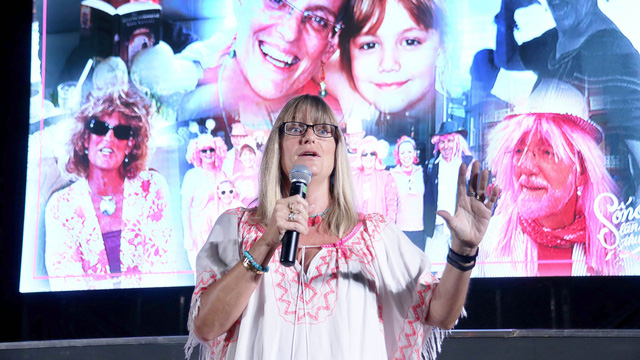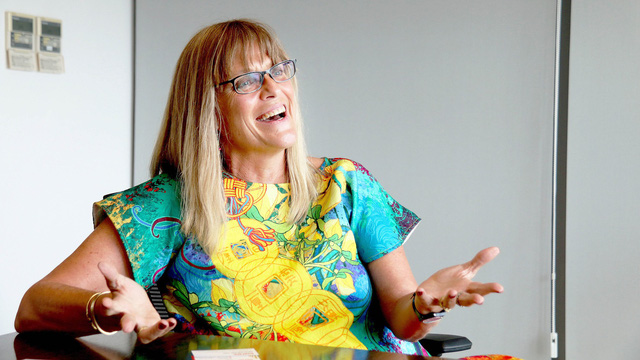“Having cancer doesn’t mean you are going to die,” insisted Karen Lanyon, Australian Consul General in Ho Chi Minh City, during an exclusive interview with Tuoi Tre News this week.
A breast cancer survivor herself, Karen Lanyon underwent surgery, chemotherapy, and radiotherapy during her battle against the disease.
Though her initial diagnosis was a shock, Lanyon was able to channel her optimistic attitude and the support of her loved ones into the strength she needed to defeat her illness.
Great support
How long has it been since you finished your breast cancer treatment?
I was diagnosed with breast cancer in 2008 while I was Minister Counselor at the Australian Embassy in Jakarta. I had a bit of treatment in Singapore and then went home to Australia to finish my treatment.
I chose to take time off work to concentrate on getting better. I had undergone surgery to completely remove a breast and lymph nodes under my arm before chemotherapy and radiotherapy. I finished my treatment in 2009.
I now have an annual checkup, and regular mammograms and ultrasounds. I see my oncologist once a year and she does all the checks I need to make sure I’m ok. So far, things are all good.
How did you feel at the moment when you suddenly changed from a healthy person to be one who were diagnosed with cancer?
Even though I knew something was wrong it still was a shock.
At first, I went to see the doctor and he said there was a lump in my breast but that it was probably just a cyst or something not worth worrying about. He said that it couldn’t be cancer because it hurt and told me to come back in six months.
I went back to Jakarta and was still in a lot of pain. My husband read a magazine article about an Australian woman who had the same symptoms as me and it turned out to be breast cancer. He told me to go back and see the doctor and insist on a biopsy. After that, the doctor came back and said “We’re very sorry, its cancer and you’re right”.
That’s why I tell people to always ask questions and argue with their doctor if they feel strong enough that they are right.
How did you overcome that shock?
I had my husband with me. He was a very big support. My work colleagues at the embassy in Jakarta were also very supportive and did everything they could to make sure I got treatment.
Then I went home and all my family and friends helped me. I went back to live with my mom and dad, and my mom took care of me. That was fantastic. I could not have done it without support from my husband and my family.
My family and relatives were also shocked. They all cried. But mom was also a cancer survivor, so we all knew that cancer doesn’t mean you die, you just have to fight. Both my mother and her sister had ovarian cancer.
You once said you have a great father who was always by your side during treatment?
My dad is a very big supporter of all three of his daughters. There are no boys in my family, but my father always said “you can do whatever you want no matter if you are a boy or girl.”
He was there with me all the way through my treatment and was very supportive. After I got better, he started to participate in walks for breast cancer patients. My whole family attended, but my father wore pink [an awareness symbol of anti-breast cancer] from head to toe. He even dyes his beard pink, wears a pink wig, and walks ten kilometers for breast cancer every year.
For the past two years he’s won best dressed at the walks. He doesn’t mind getting dressed up in pink. As he says it, “real men wear pink.”
 |
| Australian Consul General in Ho Chi Minh City Karen Lanyon speaks at Pink Hat Day, an event held by Breast Cancer Network Vietnam in October 2017, with picture of her father dressing in pink (bottom right) on the background screen - Photo: NGOC HIEN |
“Look at me…”
Last October you were invited to Pink Hat Day, an event held by Breast Cancer Network Vietnam. How did you feel when your story received a big round of applause from attendees?
I was very happy, of course, because I am a breast cancer survival myself. It’s an issue that’s very important for me, and I think it’s very important to spread awareness so that we can save other women’s lives.
It took many years for Australia to get ready for breast cancer awareness. When I was younger, it was something that not many people spoke or knew much about. Many women thought that if they were diagnosed with breast cancer it meant they would die.
Because of that, I like to do whatever I can to support other women. I tell them what we often say in Australia: cancer is not a sentence. It doesn’t mean that if you get cancer you will die. I like to spread that message and help other women become aware of cancer and begin having regular breast check-ups.
But not everybody can be that positive. How can we change people's mind?
I think we have to talk about it. That’s why I’m very happy to share my experience with breast cancer. I’ve shared a lot of stories about my journey and also pictures of me after all my hair fell out. I think the more people talk about it, the better.
“Look at me, I had cancer and I’m still alive, you can survive and can be ok!,” I can say.
Was there any moment that you were particularly upset? How about when you hair fell out?
Oh, the hair falling out was nothing. It’d grow back. Fortunately, I looked good bald! [laugh].
If it came to be upset, that might be when I underwent surgery, there were so many things that happened. I was like “why me?” and felt my life was over, but then I thought “ok that’s not going to help,” so I just got to stop and fight.
“Fight like a girl”
You are a very optimistic woman. How does that spirit contribute to cancer treatment?
I think my optimism is why I’m still here. It’s really important to have an optimistic and positive attitude when you are sick. It helps with fighting the disease.
I think if you give up and say “I have cancer, I am going to die” and sit in a corner, then you probably will.
But if you say “I’ve got cancer, I can beat it, I am going to fight it, I am going to do everything I can to make my survival better”, things can be different.
When I found out that I had cancer, I stopped drinking alcohol, I made sure my diet was very clean, I got lot of sleep, I exercised a lot, and I did everything I was supposed to do.
That means you make the decision to make yourself better.
Looking back at your journey, which word would you use to describe it?
I would say “strength”. You have to be strong in many ways: strong enough to ask questions, strong enough to fight, and strong enough to help others when your treatment is finished.
We once did a breast cancer awareness photo shoot and my favorite poster at the shoot said “Fight like a girl.” Yes, women are warriors, and I think it’s important for us to be strong and fight back against disease.
What advice would you like to give to people with cancer?
I know women are afraid of talking about their bodies in public. In Australia, there were whole generations of women who didn’t talk about cancer because it’s in the…breast. But it is not only about breasts. People in general are afraid of talking about cancer too.
Some Vietnamese women have told me that they don’t want people to feel sorry for them and treat them differently because they have cancer. I don’t think they’re right, though. All my friends offered me their support. They even gave me a wig. It was a positive gesture, not a negative one.
I think more women will die from cancer if we don’t speak out. One way we can help women in Vietnam is by overcoming the stigma of cancer by creating an environment where women can talk about their bodies, cancer, and survival.
I also want to tell people with cancer that they should be informed and find out as much as they can about the disease when they are diagnosed.
Ask your doctor a lot of questions and question everything you are told. Make sure you are comfortable with your treatment. It’s your body so you can ask as many questions as you’d like.
With a really positive attitude and the support from loved ones, I think everyone can have a better chance of survival.
|
Before arriving in Vietnam as the Australian Consul General in Ho Chi Minh City, Karen Lanyon served as the Australian Consul General in Los Angeles, Minister Counselor at the Australian Embassy in Indonesia, Deputy Head of Mission in Cambodia, and Foreign Affairs and Trade Regional Director in Sydney. Karen Lanyon has supports Breast Cancer Network Vietnam which follows the model of Breast Cancer Network of Australia. She told Tuoi Tre News that the Australian Government and the Australian Consulate are willing to assist in the development of breast cancer networks in Vietnam and raise the awareness of breast cancer among Vietnamese women. |




















































